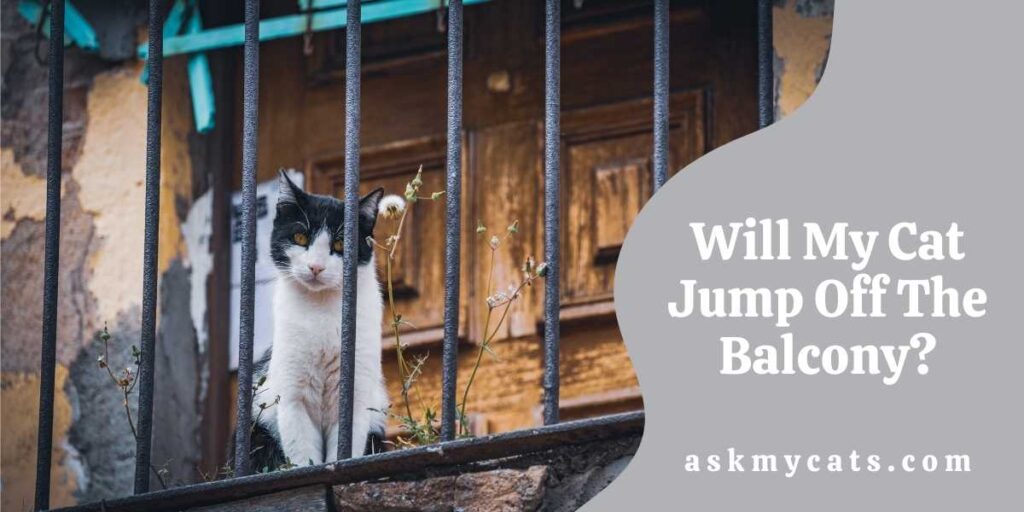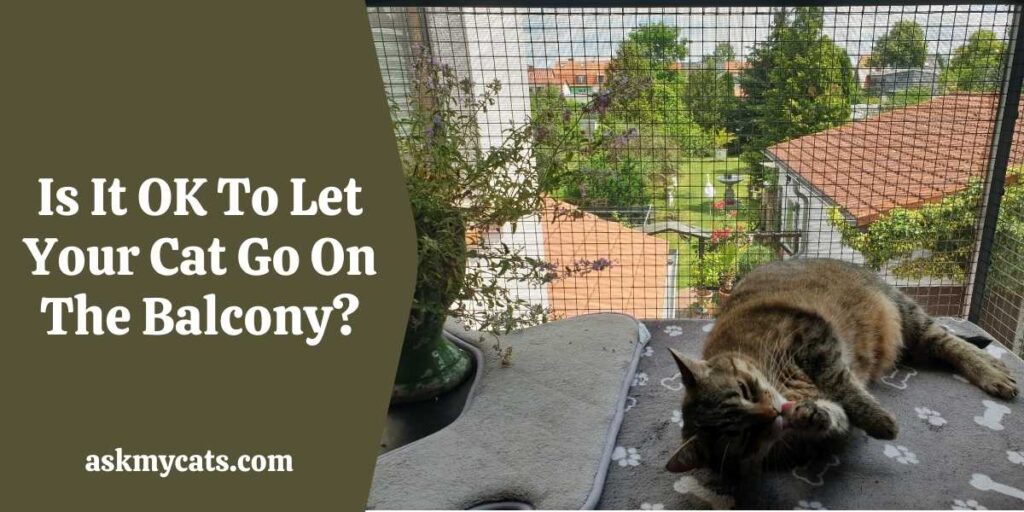Cats should avoid houses and high-rise apartments with balconies. Cats, as curious creatures, will naturally want to investigate what’s going on outdoors. This might result in a blunder in judgment.
You’ll need to either restrict your cat’s access or make your balcony secure.
Cats don’t usually jump off balconies, but when they lose their equilibrium or miss their landing and fall, they’re attempting to jump to something. Cats that survive the initial fall have a reasonable survival rate, although severe injuries are common. Not all cats survive falls from great heights.
Keep on reading to get a clear idea about the nature of cats jumping off the balconies or not.


Give Your Cat the Perfect Day
Get the Free Ebook!
Is It OK To Let Your Cat Go On The Balcony?
Letting your cat go on the balcony is safe, followed by some precautions.

Your cat’s safety is the most important consideration when allowing them onto a balcony. You want to make sure your cat can’t leave the balcony, especially if you live in a high-rise building.
A fully screened-in balcony is ideal, but you may also enclose your outside space with netting or fencing. You could even construct your kitten its own “catio” outside if you’re that motivated!
If you create a catio or completely enclose your balcony, make sure your cat can go back inside whenever they want—you don’t want your kitty to be locked outside when it’s hot or cold!
Remember that cat-proofing your balcony isn’t always as simple as it appears since cats are very clever!
If you can’t enclose your balcony or create a catio because you rent or it’s too expensive, you may take your cat out for some outdoor time with a collar and leash, but they should never be left alone on the balcony.
Consider your cat’s nature when considering whether or not to take them outside without an enclosure—would your cat respond nicely if a dog or another cat passed by?
Also, a cat that has been spayed or neutered is less prone to roam, so keep that in mind when deciding whether or not to let your feline companion go outside!
Ensure your cat is vaccinated and microchipped before allowing them on the balcony, just in case the worst happens! If letting your cat sit on the balcony seems too much work, offer them a lovely seat indoors near a window with a good view!
That way, they may observe the goings-on in the area without risking escaping. If going outside seems too dangerous, you may keep them emotionally and physically occupied within.
Balconies may be a lot of fun for your cat if you take the proper precautions—make sure you think it through and prepare appropriately before allowing them to spend time outside! And if you have any doubts about the safety of your outdoor location, keep them inside.
Are Cats Smart Enough To Not Jump Off A Balcony?
Cats have excellent survival instincts and are pretty unlikely to jump from balconies intentionally.

Cats, on the other hand, are prone to falling. They might lose balance when strolling on a balcony, get carried away by strong gusts, or chase birds and miss landings.
The flexibility and quick reflexes of cats allow them to flip right-side-up as they fall, landing on the soft pads of their feet.
Cats spread out in a flying squirrel pose to delay their fall as they fall from greater heights. Some cats may survive multi-story falls thanks to these talents, although they frequently suffer serious injuries such as broken legs, punctured lungs, and brain traumas.
Cats are guided by their instincts for survival. As a result, it’s improbable that a cat will jump from a balcony of its own volition. We’d go so far as to say that this is practically unheard of. Unfortunately, this does not mean you can relax regarding balcony safety.
Cats in the wild go to tremendous lengths to keep themselves secure. As a result, a cat will never jump from a great height on purpose. They are aware that this might result in injury or death. This is why cats in a yard climb a tree and eventually become stuck.
So, why is it that there are so many high-rise occurrences throughout the summer? Cats have incredible survival instincts, but they also tend to fixate on one item that interests them. A fall is possible as a result of this.
This is more likely to occur during the summer than during the winter. Cats adore the sun. Many pets will seek warm spots to sunbathe in the sun, and prey will be plentiful throughout the summer months.
You must like to read details about How To Keep Cat From Jumping Over Gate
Is It Safe To Let Cats Out On Balcony?
If you have taken proper precautions, it is safe to let cats out on the balcony, except if he suffers from high-rise syndrome.

The frequency of “high-rise syndrome” in cats increases as the temperature outside rises. For this reason, a cat’s access to the balcony should be restricted.
The phrase “high-rise syndrome” was coined in the 1980s during a 5-month period in which cats were taken into a veterinary clinic in New York due to falling off balconies and high-rises.
Head and face damage, fractured legs, and chest trauma were among the serious injuries sustained by the cats. It’s not rare for a cat to perish after falling from a balcony, despite its ability to land on its feet.
Don’t let the name deceive you. Although the term “high-rise syndrome” alludes to buildings in Manhattan, any fall is deadly.
As we’ll see momentarily, falling from the fourth level might be more dangerous than falling from the fourteenth.
Assume that a cat will fall from a balcony at any time. The essential word here is “fall.” Although your cat is unlikely to jump from a great height for fun, this does not rule out the possibility of an unintentional fall.
As previously stated, cats that fall from great heights have a 90% chance of survival if given prompt and adequate medical assistance.
One hundred thirty-two cats were evaluated after falling from an average of 5.5 stories to a maximum of 32 stories, according to the Journal of the American Veterinary Medical Association. Cats that fell from more considerable heights had more time to attain terminal velocity, resulting in a 90% survival rate.
As a result of their collision with the ground, two-thirds of the 132 cats required medical attention. In addition, without life-saving therapy, 37 percent of the cats with thoracic injuries and shock would have died.
If your cat falls from a great height, it will likely pick itself up and go away. This behavior should not be taken lightly. The cat may have suffered catastrophic, life-threatening injuries. These might have far-reaching consequences.
Regardless of how your cat seems after a fall, they may require veterinarian care. After several hours or days, it may succumb to injury.
Consider a fall from a great height to be just as hazardous as a car collision. Both of these issues contribute to a large amount of feline death.
How To Keep Cats Off Balcony Railing?
You can close the balcony door to restrict cats from the balcony railing.
During the summer, it’s only natural to want to keep the doors to your balcony open. When assessing the dangers to feline safety, evaluate whether the fresh air given is a fair exchange.
Cats have a strong will and are instinctively motivated. As a result, you must be cautious about allowing someone to fall from a balcony. Because cats are expert escape artists, a screened-in cage may not be enough.
Cats may climb onto screens that are high enough to prohibit them from doing so. Any furniture should be moved away from the balcony’s borders. Cats will use anything as a springboard if they can.
Keep your cat on a leash outside if you want it to enjoy some fresh air. This must be a harness, with the least weight being linked to the back or chest. If the cat leaps without notice, the collar poses a choking threat.
You may also keep your cat away from a balcony. There are several ways to do this, which need training, patience, and awareness. When a cat has an idea, it will look for every chance to make it a reality.
Through aroma and texture, you may make a balcony uninviting to cats. Apply unpleasant fragrances and don’t give any hiding spots, such as plants. Popular selections include pepper and citrus fruit.
The texture of the balcony ground may also be changed. Cats, for example, despise sticky feelings. Only if you don’t utilize your balcony will this work.
Cats like to spend time outside when the weather is warm. With this in mind, you might want to try letting your cat out into the yard. If you live in an apartment and can’t do this, then you can leash-train your cat and take it on a stroll.
Your cat is less likely to seek outside prey if it is less active and disturbed. At least twice a day, play with your cat. This will satiate the hunting impulses of cats. As a result, your cat is less inclined to pursue animals, particularly birds, due to this.
Always get your cat examined by a veterinarian if it falls from a balcony. Highrise syndrome has a reasonable survival probability only if the victim receives quick medical attention. Don’t assume your cat is fine; the problem might be inside.
Frequently Asked Questions
How do you train a cat on a balcony?
The first option is to use a mesh or screen to keep your cat from jumping or falling from the balcony. You’ll need to wrap the railing with mesh if the bottom half of your balcony isn’t an entire wall. Fresh air is allowed in, and it does not obstruct much light. Netting is the second method of catproofing.
What is high-rise syndrome in cats?
Cats can suffer high-rise syndrome if they fall from a great height, such as an internal second-floor landing or balcony, out a window, down a fire escape, or fail a jump from a landing to a higher architectural element, such as a ledge or window.
How do you enclose a balcony for a cat?
“Catios” is especially beneficial for city residents and people who do not have backyards but wish to provide their cats with safe outside and fresh air exposure. Attach barrier material to the posts or rails to entirely or partially enclose the interior perimeter of your balcony.
Final Words
Cats have good depth awareness, so it’s doubtful they’d jump off high-rise apartment balconies willingly. Cats aren’t afraid of heights and aren’t afraid of falling. They instinctively realize that they should not leap from a balcony.
Ask your questions in the comments section below.
